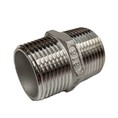1. Tensile Strength: Steel pipes have high tensile strength due to their composition and manufacturing process. Tensile strength refers to the ability of a material to withstand pulling or stretching forces without breaking or deforming. Steel pipes can withstand significant loads, making them suitable for various structural applications.
2. Ductility: Steel pipes exhibit excellent ductility, allowing them to undergo extensive deformation before rupturing. This property is crucial in scenarios where the material needs to withstand bending, forming, or other types of mechanical stress without failure.
3. Resistant to Deflection: Steel pipes are less prone to deflection under heavy loads compared to iron pipes. This is due to their higher modulus of elasticity, which measures a material''s resistance to deformation when subjected to an applied force.
4. Corrosion Resistance: Steel pipes can be manufactured with different coatings, such as galvanization, which provides excellent corrosion resistance. This is particularly vital in environments where exposure to moisture, chemicals, or other corrosive substances is a concern.
1. Brittle Nature: Iron pipes lack the ductility of steel and tend to be more brittle. They are susceptible to cracking or breaking under tension or impact, making them less suitable for applications that require flexibility or tolerance to stress.
2. Limited Tensile Strength: Iron pipes generally have lower tensile strength compared to steel. They might fail under relatively lower loads, compromising their suitability for certain structural requirements.
3. Vulnerability to Corrosion: Iron pipes are prone to corrosion, especially in wet environments or when coming into contact with acidic or alkaline substances. Over time, this can lead to pipe degradation, reduced lifespan, and the potential for leaks or failures.
4. Good Fire Resistance: One advantage of iron pipes is their excellent fire resistance. They have a high melting point, which makes them less susceptible to damage caused by fire or extreme heat. This property is particularly important in applications where fire safety is a primary concern.
1. Strength Requirements: Assess the intended use and determine the required strength for the application. Steel pipes are generally stronger and better suited for heavy-duty structural purposes.
2. Environmental Factors: Consider the environmental conditions, including moisture levels, the presence of corrosive substances, or extreme temperatures. If corrosion resistance is critical, steel pipes with appropriate coatings may be a preferred option.
3. Budget Constraints: Cost is an important consideration for any project. Steel pipes generally tend to be more expensive than iron pipes. Evaluating the project''s budget requirements is essential while maintaining a balance between cost and strength requirements.
4. Flexibility and Stress Tolerance: Evaluate the tolerance of the pipes to bending, deformation, or stress. Steel pipes offer higher ductility and resistance to deflection, making them suitable for applications where flexibility is important.




